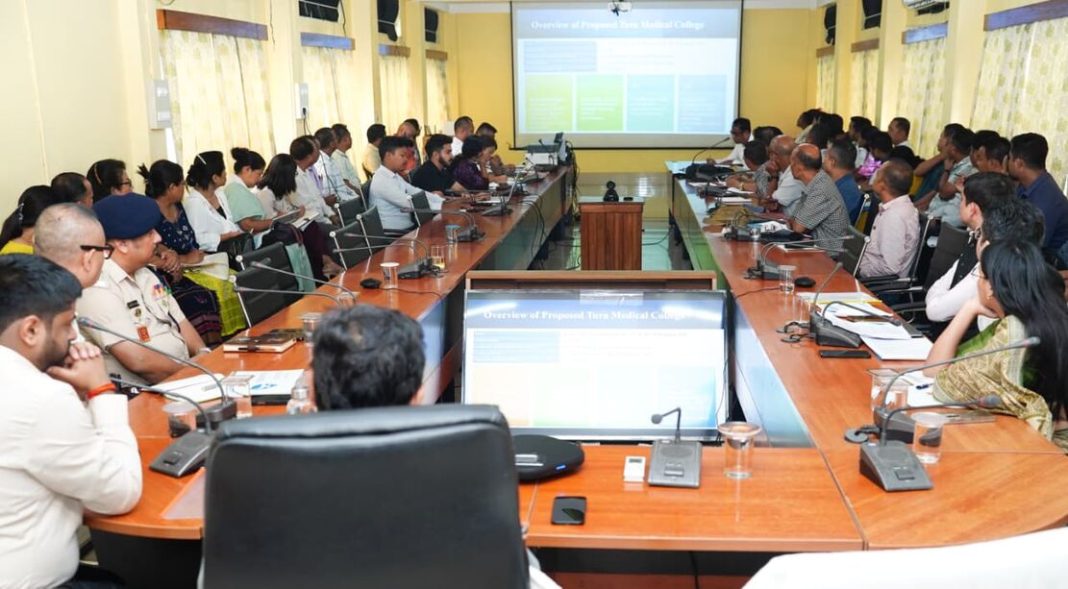State to produce 550 doctors annually by 2030s
Tura, Aug 29: Meghalaya Chief Minister Conrad K Sangma today chaired a high-level review meeting with senior officials of Garo Hills at the Circuit House in Tura, laying emphasis on three crucial sectors- the Tura Medical College, sports development, and the Jal Jeevan Mission (JJM). The meeting was aimed at resolving any bottlenecks, ensuring timely project completion, and enhancing critical services for citizens.
Tura Medical College nears completion, Shillong College classes from September
With 78 percent of work at the Tura Medical College completed, officials informed the chief minister that the project is on track for a September 2026 finish.
The Tura medical college, sprawling across 84 acres, includes 47,000 square meters of academic and administrative space and a 735-bed teaching hospital. Challenges like faculty recruitment and road safety concerns, including a steep bridge slope needing realignment, were flagged during the review meeting with the chief minister.
Meanwhile, officials informed that the Shillong Medical College is set to start classes by September 2025, with admissions through the 15 percent All-India quota and State counselling.
Chief Minister Conrad K Sangma exuded confidence that by the mid-2030s, the three medical colleges operational in the state- Shillong, Tura and USTM medical colleges, are expected to produce over 550 doctors annually, significantly reducing Meghalaya’s reliance on central pool seats.
Sports development: Building from the grassroots
During a review on sports development and infrastructure, Chief Minister Conrad K Sangma emphasized nurturing sports talent at village and block levels through better facilities, coaching and local club engagement. Proposals were put forward for ensuring regular district and state level tournaments, capacity building for coaches and referees, leveraging retired athletes, and giving maximum support for chess and athletics that have been identified as high-potential areas. The Chief Minister directed officials to create a roadmap balancing grassroots and elite sports, reminding officials that issues need to be raised openly during such reviews, and urging district administrations to take greater responsibility.
Discussions were also held on proper land use and infrastructure planning, with a proposal to integrate multipurpose complexes that can serve administrative, secretariat, and sport’s needs. The Chief Minister highlighted the importance of sustainability and long-term vision in planning, while also noting that timely completion of projects must remain a priority. He emphasized that public outreach programs such as CM Connect would continue to bridge communication between the government and citizens, ensuring that feedback from the grassroots is directly integrated into policy.
Jal Jeevan Mission hurdles- 90% completed but 20% without water
The daylong review meeting chaired by the chief minister witnessed a significant portion dedicated to the Jal Jeevan Mission in the Garo Hills region.
Despite a reported 90% completion rate, the JJM struggles with 20% of households still lacking reliable water supply. There have been multiple issues plaguing this mega national project, including power shortages in hilly areas, underperforming solar projects in plains, and inactive Village Water and Sanitation Committees (VWSCs). Technical flaws in early projects, such as shortcomings in Detailed Project Reports, inadequate pipe sizes and insufficient water sources, and improper implementation by contractors which affected performance of the scheme were also brought to the fore during the review meeting, alongside delays due to forest clearances.
The Chief Minister acknowledged that while the rush to meet targets may have compromised sustainability, the focus must now shift to corrective measures. He urged officials to prioritize quickly resolvable schemes while developing long-term solutions for complex issues.
Financial constraints, with ₹2,000 crores in pending contractor payments due to delay in funds release from the central government, also added to the challenges in implementation of the JJM project in the state, it was noted. While optimistic the situation would improve by the year’s end, the chief minister also pointed out that maintaining the Village Water and Sanitation Committees would require nearly Rs 500 crores annually- something that is unsustainable for the state. He has called for a state-wide audit to identify functional schemes and proposed cluster-based approaches, cost-sharing with villagers, and partnerships with self-help groups, NGOs, and youth organizations. Proposals such as introducing maintenance contracts requiring contractors to remain responsible for 2–3 years post-completion and engaging local community members for small incentives were welcomed as practical solutions.




